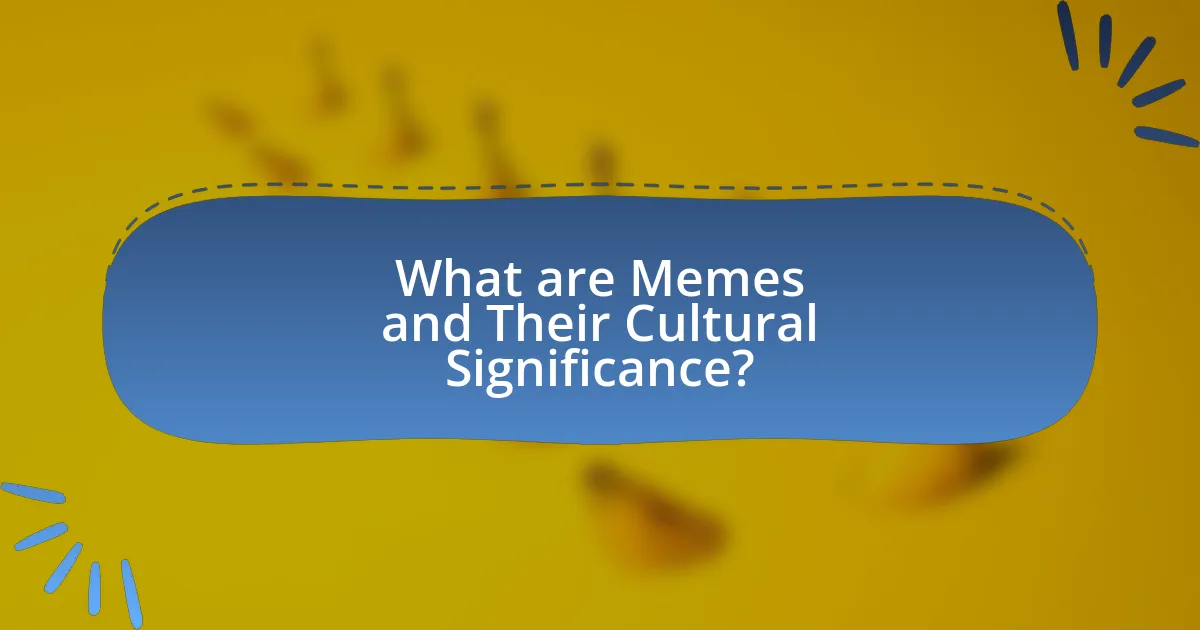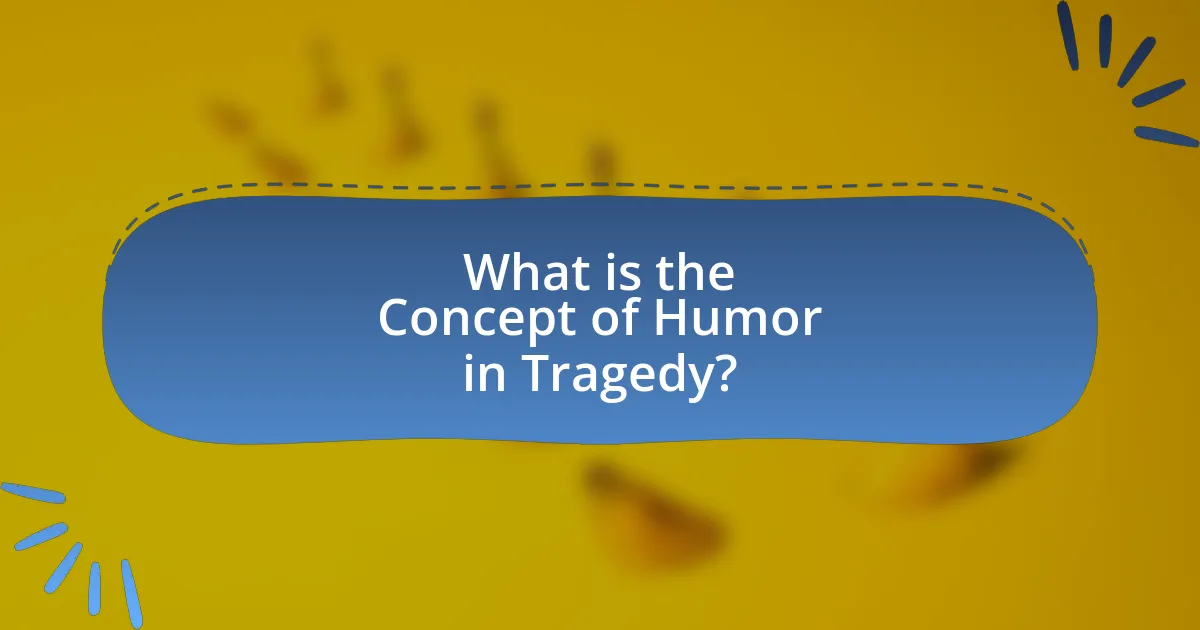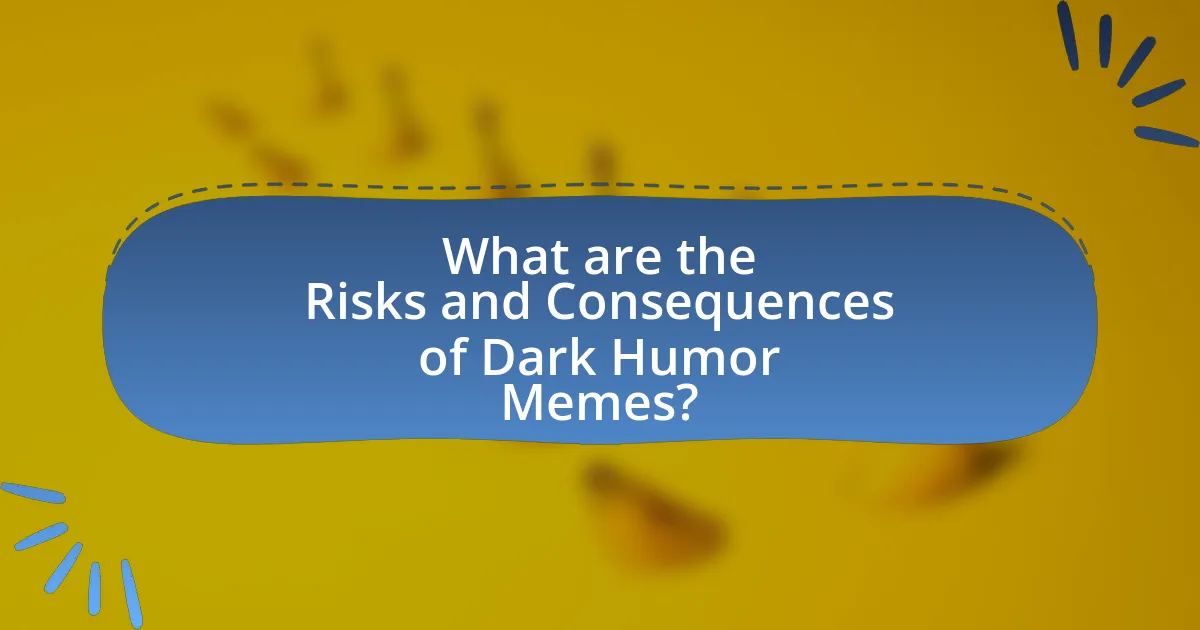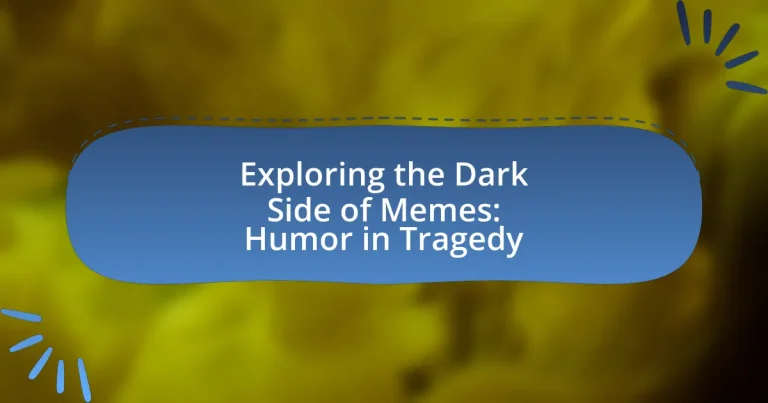Memes are units of cultural information that spread virally, significantly influencing societal attitudes and public discourse. This article explores the cultural significance of memes, particularly focusing on their role in humor related to tragedy and dark themes. It examines how memes reflect societal values, serve as social commentary, and impact mental health and well-being. Additionally, the article discusses the psychological factors driving the creation of dark humor, the ethical implications of using humor in tragic contexts, and strategies for sharing dark humor responsibly. Understanding these dynamics enhances media literacy and critical engagement with digital content.

What are Memes and Their Cultural Significance?
Memes are units of cultural information that spread virally, often in the form of images, videos, or text, and they play a significant role in shaping social commentary and collective identity. Their cultural significance lies in their ability to reflect societal values, humor, and shared experiences, often addressing complex issues through satire or parody. For instance, the “Distracted Boyfriend” meme illustrates societal attitudes towards relationships and infidelity, while also providing a humorous lens through which to view these topics. Memes can influence public discourse, as seen during political events where memes serve to simplify and amplify messages, making them more accessible to a broader audience.
How do memes reflect societal attitudes and beliefs?
Memes reflect societal attitudes and beliefs by encapsulating cultural norms, values, and collective sentiments in a concise and often humorous format. They serve as a mirror to society, highlighting prevailing opinions on various issues, including politics, social justice, and personal identity. For instance, during significant events like the COVID-19 pandemic, memes emerged that both criticized governmental responses and provided comic relief, showcasing public frustration and resilience. Research by the Pew Research Center indicates that 55% of Americans have shared memes related to social issues, demonstrating their role in shaping and expressing societal discourse.
What role do memes play in shaping public discourse?
Memes play a significant role in shaping public discourse by facilitating the rapid dissemination of ideas and opinions, often influencing societal perceptions and behaviors. They serve as a form of social commentary, allowing individuals to express complex emotions and viewpoints succinctly, which can lead to increased engagement in political and social issues. For instance, during major events like elections or social movements, memes can encapsulate public sentiment, making them a powerful tool for mobilization and awareness. Research indicates that memes can affect public opinion by framing issues in a way that resonates with audiences, as seen in studies analyzing the impact of memes on voter behavior and social activism.
How do memes serve as a form of social commentary?
Memes serve as a form of social commentary by encapsulating complex societal issues in a relatable and often humorous format. This allows individuals to engage with topics such as politics, social justice, and cultural norms in a way that is accessible and shareable. For instance, memes that critique political figures or highlight social injustices can spread rapidly across social media, prompting discussions and raising awareness about these issues. Research indicates that memes can influence public opinion and mobilize social movements, as seen during events like the Arab Spring, where memes played a role in organizing protests and disseminating information.
Why do people create and share dark humor memes?
People create and share dark humor memes as a coping mechanism to deal with difficult or taboo subjects. This form of humor allows individuals to express their discomfort with serious issues, such as death or tragedy, in a way that feels safe and socially acceptable. Research indicates that humor can serve as a psychological defense, helping people to alleviate anxiety and foster social connections through shared laughter, even in the face of adversity. For example, a study published in the journal “Psychological Science” found that humor can enhance resilience by providing a means to reframe negative experiences.
What psychological factors drive the creation of dark humor?
The psychological factors driving the creation of dark humor include coping mechanisms, social bonding, and the exploration of taboo subjects. Individuals often use dark humor as a way to process trauma or anxiety, allowing them to confront uncomfortable realities in a less threatening manner. Research indicates that humor can serve as a defense mechanism, helping people to mitigate stress and emotional pain (Martin, R.A., 2007, “The Psychology of Humor: An Integrative Approach”). Additionally, dark humor can foster social connections by creating a shared understanding among individuals who appreciate its nuances, thus reinforcing group identity. The ability to joke about sensitive topics also reflects cognitive flexibility, as it requires a nuanced understanding of context and the ability to navigate complex emotional landscapes.
How does dark humor help individuals cope with tragedy?
Dark humor helps individuals cope with tragedy by providing a psychological mechanism to process grief and distress. This form of humor allows people to confront uncomfortable emotions and situations in a less threatening way, facilitating emotional release and reducing anxiety. Research indicates that engaging with dark humor can promote resilience, as it encourages individuals to find meaning in suffering and fosters social connections through shared laughter. For instance, a study published in the journal “Personality and Individual Differences” by researchers Rod A. Martin and others found that individuals who appreciate dark humor tend to have better coping strategies in the face of adversity.

What is the Concept of Humor in Tragedy?
The concept of humor in tragedy involves the juxtaposition of comedic elements within serious narratives to highlight the absurdity of human existence. This interplay serves to provide relief from emotional intensity, allowing audiences to process grief and suffering through laughter. Historical examples include Shakespeare’s use of comic relief in plays like “Hamlet,” where the gravedigger’s scene offers a moment of levity amidst the overarching themes of death and despair. This technique underscores the complexity of human emotions, illustrating how humor can coexist with tragedy, ultimately enriching the audience’s experience and understanding of both.
How can humor be derived from tragic events?
Humor can be derived from tragic events through the process of reframing, where individuals reinterpret a painful experience in a lighter context. This psychological mechanism allows people to cope with grief and trauma by finding absurdity or irony in the situation, which can serve as a coping strategy. For instance, comedians often use dark humor to address sensitive topics, making them more approachable and relatable. Research by the University of California, Los Angeles, indicates that humor can act as a psychological buffer, helping individuals manage stress and emotional pain associated with tragedy.
What are the ethical implications of using humor in tragedy?
The ethical implications of using humor in tragedy include the potential for insensitivity and the risk of trivializing serious issues. Humor can serve as a coping mechanism, allowing individuals to process grief or trauma; however, it can also alienate those affected by the tragedy, leading to feelings of disrespect or hurt. For instance, studies have shown that humor can create a sense of community among those who share similar experiences, yet it can simultaneously reinforce social stigmas or perpetuate harmful stereotypes if not approached thoughtfully. Therefore, the ethical use of humor in tragic contexts requires a careful balance between providing relief and maintaining respect for the gravity of the situation.
How does context influence the reception of tragic humor?
Context significantly influences the reception of tragic humor by shaping audience perceptions and emotional responses. Factors such as cultural background, personal experiences, and situational context determine whether individuals find tragic humor acceptable or offensive. For instance, research indicates that humor related to recent tragedies may be perceived as inappropriate, while humor that emerges over time can facilitate coping and social bonding. A study published in the journal “Humor: International Journal of Humor Research” by authors Wilkins and Eisenberg (2009) found that individuals who share similar experiences with a tragedy are more likely to appreciate humor derived from it, highlighting the role of shared context in shaping responses to tragic humor.
Why do some audiences respond positively to dark humor?
Some audiences respond positively to dark humor because it allows them to confront uncomfortable truths and emotions in a safe context. This type of humor can serve as a coping mechanism, helping individuals process grief, anxiety, or societal taboos. Research indicates that dark humor can foster social bonding, as shared laughter in the face of adversity creates a sense of community among those who appreciate it. For instance, a study published in the journal “Cognitive Processing” by researchers Peter McGraw and Caleb Warren found that individuals who enjoy dark humor often possess higher levels of psychological resilience, enabling them to navigate life’s challenges more effectively.
What factors contribute to the acceptance of dark humor in different cultures?
The acceptance of dark humor in different cultures is influenced by factors such as cultural norms, historical context, social taboos, and individual psychological resilience. Cultural norms dictate what is considered acceptable or offensive, with some societies being more open to discussing taboo subjects through humor. Historical context plays a significant role; for instance, cultures that have experienced trauma may use dark humor as a coping mechanism, as seen in post-war societies where humor helps process collective grief. Social taboos also shape the boundaries of humor; in cultures where death and tragedy are openly discussed, dark humor may be more readily accepted. Additionally, individual psychological resilience affects how people respond to dark humor, with those possessing higher resilience often finding it more acceptable as a means of confronting uncomfortable truths.
How does personal experience shape one’s reaction to dark humor?
Personal experience significantly influences an individual’s reaction to dark humor by shaping their emotional responses and contextual understanding. For instance, someone who has experienced trauma may find dark humor unsettling or offensive, as it can evoke painful memories, while another person who has not faced similar experiences may perceive it as a coping mechanism or a form of relief. Research indicates that humor often serves as a psychological tool for processing difficult emotions, suggesting that those with relevant personal experiences may react more sensitively to dark humor compared to those without such backgrounds.

What are the Risks and Consequences of Dark Humor Memes?
Dark humor memes pose significant risks and consequences, including the potential to normalize harmful attitudes and desensitize individuals to serious issues. Research indicates that exposure to dark humor can lead to increased aggression and a diminished capacity for empathy, particularly among younger audiences. A study published in the journal “Personality and Individual Differences” found that individuals who frequently engage with dark humor may exhibit lower levels of compassion and higher levels of hostility. Additionally, dark humor memes can perpetuate stigma surrounding mental health and trauma, making it difficult for individuals affected by these issues to seek help or feel understood.
How can dark humor memes perpetuate harmful stereotypes?
Dark humor memes can perpetuate harmful stereotypes by normalizing offensive ideas and reinforcing negative perceptions about specific groups. These memes often rely on exaggeration and shock value, which can desensitize audiences to serious issues and lead to the trivialization of marginalized experiences. Research indicates that humor, particularly dark humor, can influence attitudes and beliefs; for instance, a study published in the journal “Personality and Individual Differences” found that individuals who engage with dark humor are more likely to endorse prejudiced views. This suggests that repeated exposure to dark humor memes can solidify harmful stereotypes in societal discourse.
What are the potential social repercussions of sharing dark humor memes?
Sharing dark humor memes can lead to significant social repercussions, including the normalization of harmful attitudes and the alienation of individuals who may find such content offensive. Research indicates that exposure to dark humor can desensitize individuals to serious issues, potentially fostering a culture where sensitive topics are trivialized. For instance, a study published in the journal “Personality and Individual Differences” found that individuals who frequently engage with dark humor may exhibit lower empathy levels towards victims of tragedy. Additionally, sharing such memes can result in social backlash, including ostracism or conflict within social groups, as differing values regarding humor can create divisions.
How can dark humor memes affect mental health and well-being?
Dark humor memes can have a complex impact on mental health and well-being, often serving as a coping mechanism for individuals dealing with trauma or distress. Research indicates that exposure to dark humor can facilitate emotional release and provide a sense of relief by allowing individuals to confront uncomfortable topics in a less threatening manner. For instance, a study published in the journal “Cognitive Processing” by researchers Peter McGraw and others found that humor, including dark humor, can help individuals process grief and anxiety, ultimately promoting resilience. However, excessive engagement with dark humor may also desensitize individuals to serious issues, potentially leading to a diminished capacity for empathy and increased feelings of isolation. Thus, while dark humor memes can offer temporary relief and foster connection among those with shared experiences, they may also pose risks to emotional well-being if relied upon excessively.
What strategies can be employed to navigate the complexities of dark humor?
To navigate the complexities of dark humor, individuals can employ strategies such as understanding the context, recognizing audience sensitivity, and establishing clear boundaries. Understanding the context involves being aware of the circumstances surrounding the humor, as dark humor often relies on shared experiences or societal issues. Recognizing audience sensitivity is crucial, as different individuals have varying thresholds for what they find acceptable; this can be informed by cultural backgrounds or personal experiences. Establishing clear boundaries helps to ensure that humor does not cross into offensive territory, which can be achieved by gauging reactions and adjusting content accordingly. These strategies are supported by research indicating that effective communication and empathy are essential in humor, particularly in sensitive topics (Martin, R. A. (2007). The Psychology of Humor: An Integrative Approach).
How can individuals discern when dark humor is appropriate?
Individuals can discern when dark humor is appropriate by assessing the context, audience, and subject matter. Context involves understanding the setting and circumstances surrounding the humor; for instance, humor about a recent tragedy may be deemed inappropriate in a public setting where those affected are present. The audience’s sensitivity and cultural background play a crucial role; humor that resonates with one group may offend another. Additionally, the subject matter must be approached with care; topics involving personal loss or trauma require a nuanced understanding of the potential impact on individuals. Research indicates that humor can serve as a coping mechanism, but its appropriateness is contingent on these factors, as highlighted in studies on humor psychology, such as those by Martin (2007) in “The Psychology of Humor: An Integrative Approach.”
What are best practices for sharing dark humor responsibly?
Best practices for sharing dark humor responsibly include understanding your audience, ensuring context is appropriate, and being mindful of the potential impact. Knowing the sensitivities of your audience helps prevent offense; for example, sharing dark humor in a group that has experienced recent trauma can be harmful. Context is crucial; humor that may be acceptable in private settings might not be suitable in public forums. Additionally, considering the potential emotional responses of others is essential, as dark humor can trigger negative feelings or memories. Research indicates that humor can serve as a coping mechanism, but it must be used judiciously to avoid exacerbating distress.
How can understanding the dark side of memes enhance our media literacy?
Understanding the dark side of memes enhances media literacy by enabling individuals to critically analyze the underlying messages and societal implications of these digital artifacts. Memes often propagate misinformation, reinforce stereotypes, or trivialize serious issues, which can distort public perception and influence behavior. For instance, research by the Pew Research Center indicates that 64% of Americans believe that fabricated news stories cause confusion about basic facts, highlighting the need for critical engagement with meme content. By recognizing the potential for harm in memes, individuals can develop a more nuanced understanding of media, fostering skills to discern credible information from misleading narratives.

